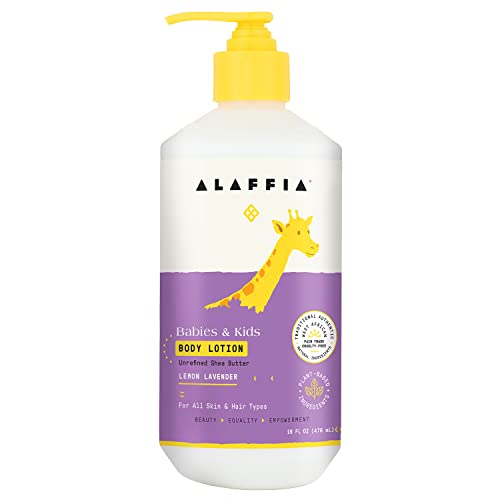
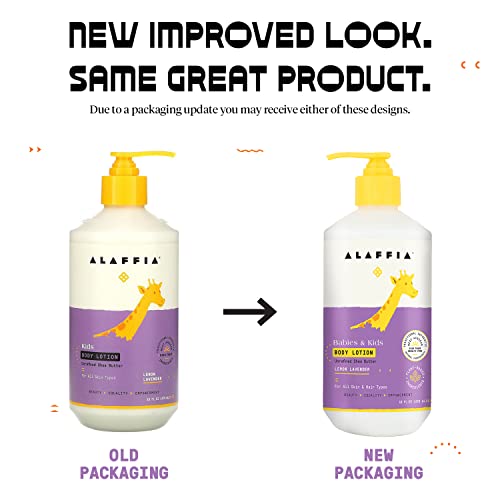
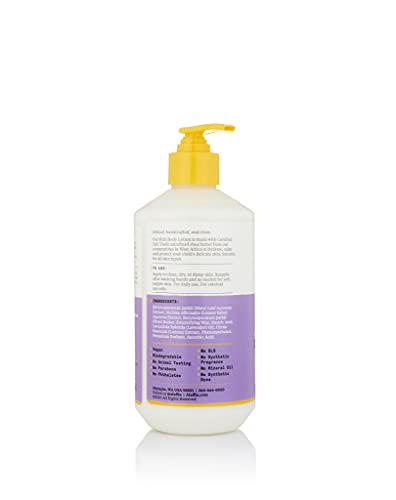
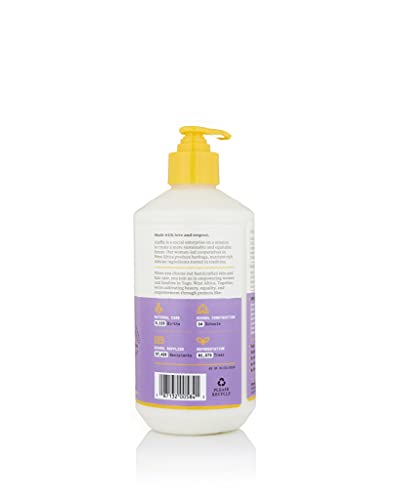
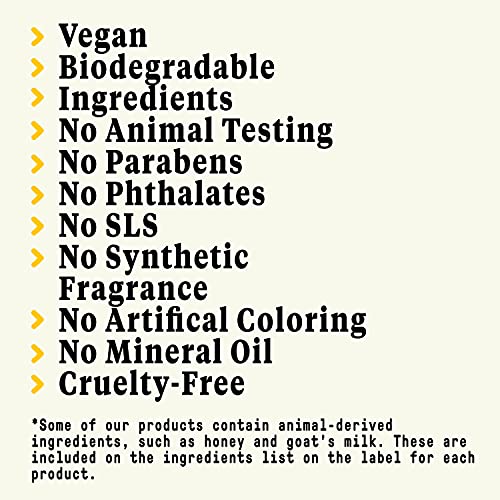
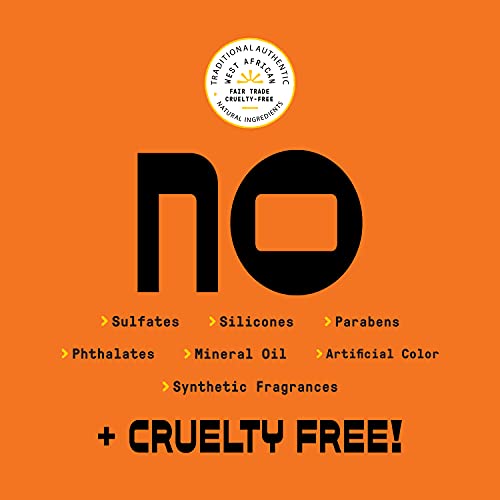

Alaffia Baby Lotion - Moisturizes & Calms Sensitive Skin with Fair Trade Shea Butter - 16 Fl Oz


Melissa Officinalis (Balm Mint) Extract
Medium RiskMelissa officinalis extract is derived from the leaves of the lemon balm plant. It is commonly used in food and cosmetic products for its potential calming properties and as a flavoring agent. The extract is recognized for its aromatic qualities and is utilized in various formulations.
Sustai Insights
Melissa officinalis extract offers functional benefits such as flavor enhancement and potential calming effects. It is generally considered low risk for carcinogenicity and developmental toxicity, though moderate concerns regarding allergies exist. Environmental risks are minimal, with no significant pollutant or bioaccumulation issues reported. Regulatory bodies have placed no major restrictions on its use, marking it as moderate risk overall. Safe usage practices should be followed, and alternatives such as chamomile extract may be considered for similar benefits.
Emulsifying Wax
Medium RiskEmulsifying wax is a mixture derived from plant and synthetic sources, primarily used to stabilize emulsions in cosmetic and personal care products. Its primary function is to blend oil and water-based ingredients, ensuring a uniform consistency and enhancing product texture.
Sustai Insights
Emulsifying wax offers functional benefits as an effective emulsifier, helping to create stable formulations in cosmetic products. It generally poses low health risks, with minimal concerns regarding carcinogenicity and allergenic potential. Environmental risks are also low, with no significant pollutant or bioaccumulation issues. However, use restrictions exist, and irritation potential is noted for sensitive skin. Regulatory assessments indicate it is safe for use within established concentration limits, leading to an overall moderate risk assessment. Alternatives like plant-based emulsifiers may offer sustainable options.
Phenoxyethanol
Medium RiskPhenoxyethanol is a preservative used in cosmetics and personal care products to prevent microbial growth and extend shelf life. It is commonly found in formulations such as lotions, creams, and serums.
Sustai Insights
Phenoxyethanol serves effectively as a preservative, ensuring product stability and safety by inhibiting microbial growth. It is considered to have low health risks regarding carcinogenicity, allergies, and reproductive toxicity. However, moderate use restrictions exist, and regulatory bodies have advised caution in specific applications. Environmental concerns include its potential as a pollutant, although it is not highly bioaccumulative. Overall, the ingredient presents a medium risk level, with safe usage practices recommended and alternative preservatives available for those seeking greener options.
Potassium Sorbate
Medium RiskPotassium sorbate is a potassium salt of sorbic acid, primarily used as a preservative in food and cosmetic products. It inhibits the growth of molds, yeast, and some bacteria, extending the shelf life of products. It is commonly found in various formulations due to its effectiveness and low toxicity.
Sustai Insights
Potassium sorbate serves as an effective preservative, preventing microbial growth in food and cosmetic products, which is vital for safety and longevity. Although it has a low risk of carcinogenicity and developmental toxicity, there is a moderate concern regarding allergies and immunotoxicity. Environmentally, it poses minimal risks as it is not significantly bioaccumulative. Regulatory agencies have verified its use, although some products may face restrictions. Overall, it is assessed as a medium risk ingredient, with safe usage practices recommended, and alternatives such as natural preservatives could be considered.
Butyrospermum Parkii (Shea Butter) Extract
Low RiskButyrospermum parkii (shea butter) extract is a natural fat obtained from the nuts of the shea tree, primarily used in cosmetics for its emollient properties, providing moisture and improving skin texture. It is often included in formulations for creams, lotions, and balms.
Sustai Insights
Butyrospermum parkii extract offers functional benefits such as moisturizing and skin conditioning, while being biodegradable and sustainably sourced. Health risks are low, with minimal concerns regarding carcinogenicity, allergies, or reproductive toxicity. Environmental impacts are also low, and it has no significant regulatory warnings. Given the overall favorable profile, the risk level is assessed as low, making it a suitable choice in cosmetic formulations.
Ascorbic Acid (Vitamin C)
Low RiskAscorbic acid (Vitamin C) is a naturally occurring antioxidant essential for various biological functions, including collagen synthesis and immune response. It is commonly used in cosmetic and food products for its preservative properties and ability to enhance skin brightness.
Sustai Insights
Ascorbic acid provides functional benefits as an effective antioxidant and preservative, contributing to skin health and product stability. It is generally recognized as safe with low health risks, including minimal concerns for carcinogenicity and allergies. Environmentally, it poses low risks, as it is biodegradable and does not bioaccumulate. Regulatory bodies like the FDA have not imposed significant restrictions on its use. Overall, the ingredient presents a low risk, with safe usage practices ensuring consumer safety, and alternatives such as natural extracts exist for those seeking different formulations.
Stearic Acid
Low RiskStearic acid is a naturally occurring fatty acid commonly found in animal and vegetable fats. It functions primarily as an emulsifier, thickener, and stabilizer in cosmetic and personal care products, providing texture and consistency.
Sustai Insights
Stearic acid offers functional benefits such as effective emulsification and stabilization of formulations. It is derived from renewable sources and is biodegradable, contributing to its sustainability profile. Health risks are low, with minimal concerns regarding carcinogenicity, allergies, or reproductive toxicity. Environmental risks are also low, with no significant pollutants or bioaccumulation concerns noted. Regulatory bodies, including the FDA, do not impose restrictions on its use. Overall, stearic acid is assessed as low risk, and its safe usage practices are well-established, with no significant alternatives needed.
Citrus Limon (Lemon) Peel Extract
Low RiskCitrus medica limonum (lemon) peel extract is derived from the peel of the lemon fruit, primarily used for its aromatic properties and potential as a natural preservative in various cosmetic and food products. It contains antioxidants and is often included for its fragrance and potential skin benefits.
Sustai Insights
Lemon peel extract offers functional benefits such as antioxidant properties and natural fragrance, contributing to product stability and appeal. It is generally regarded as low risk for health concerns, including carcinogenicity and allergies. Environmental assessments indicate low pollutant potential and no significant bioaccumulation. Regulatory bodies, including the FDA, do not impose significant restrictions. Safe usage practices are advisable, particularly for sensitive skin, and while alternatives exist, lemon peel extract remains a low-risk ingredient overall.
Lavandula Hybrida Oil
Low RiskLavandula hybrida oil is an essential oil obtained from the hybrid lavender plant, known for its aromatic properties and use in various cosmetic and therapeutic applications. It is commonly used for its fragrance and potential calming effects in personal care products.
Sustai Insights
Lavandula hybrida oil offers functional benefits as a fragrance and may have mild calming effects. It is sustainably sourced and typically presents low risks for carcinogenicity, allergies, and reproductive toxicity. However, it carries low to moderate concerns about endocrine disruption. Environmental impacts are minimal, and it is not currently subject to significant regulatory restrictions. Overall, the risk level associated with this ingredient is low, making it a relatively safe option in product formulations.
Butyrospermum Parkii (Shea) Butter
Low RiskButyrospermum parkii (shea) butter is a vegetable fat derived from the nuts of the shea tree. It is commonly used in cosmetic formulations for its emollient properties, providing moisture and improving skin texture. Additionally, shea butter is known for its ability to enhance the stability of products and deliver a creamy texture.
Sustai Insights
Shea butter offers functional benefits as an effective moisturizer, enhancing skin barrier function and texture. It is sustainably sourced and biodegradable, contributing to eco-friendliness. Health-wise, it is associated with low risks for carcinogenicity, allergies, and reproductive toxicity. Environmental impacts are minimal, with no significant pollutant potential identified. Regulatory assessments indicate no current restrictions. Overall, the ingredient presents a low risk, making it a favorable choice in cosmetic formulations.
Butyrospermum Parkii (Shea Butter) Extract
Low RiskButyrospermum parkii (shea butter) extract is a natural fat obtained from the nuts of the shea tree, primarily used in cosmetics for its emollient properties, providing moisture and improving skin texture. It is often included in formulations for creams, lotions, and balms.
Sustai Insights
Butyrospermum parkii extract offers functional benefits such as moisturizing and skin conditioning, while being biodegradable and sustainably sourced. Health risks are low, with minimal concerns regarding carcinogenicity, allergies, or reproductive toxicity. Environmental impacts are also low, and it has no significant regulatory warnings. Given the overall favorable profile, the risk level is assessed as low, making it a suitable choice in cosmetic formulations.
Ascorbic Acid (Vitamin C)
Low RiskAscorbic acid (Vitamin C) is a naturally occurring antioxidant essential for various biological functions, including collagen synthesis and immune response. It is commonly used in cosmetic and food products for its preservative properties and ability to enhance skin brightness.
Sustai Insights
Ascorbic acid provides functional benefits as an effective antioxidant and preservative, contributing to skin health and product stability. It is generally recognized as safe with low health risks, including minimal concerns for carcinogenicity and allergies. Environmentally, it poses low risks, as it is biodegradable and does not bioaccumulate. Regulatory bodies like the FDA have not imposed significant restrictions on its use. Overall, the ingredient presents a low risk, with safe usage practices ensuring consumer safety, and alternatives such as natural extracts exist for those seeking different formulations.
Melissa Officinalis (Balm Mint) Extract
Medium RiskMelissa officinalis extract is derived from the leaves of the lemon balm plant. It is commonly used in food and cosmetic products for its potential calming properties and as a flavoring agent. The extract is recognized for its aromatic qualities and is utilized in various formulations.
Sustai Insights
Melissa officinalis extract offers functional benefits such as flavor enhancement and potential calming effects. It is generally considered low risk for carcinogenicity and developmental toxicity, though moderate concerns regarding allergies exist. Environmental risks are minimal, with no significant pollutant or bioaccumulation issues reported. Regulatory bodies have placed no major restrictions on its use, marking it as moderate risk overall. Safe usage practices should be followed, and alternatives such as chamomile extract may be considered for similar benefits.
Stearic Acid
Low RiskStearic acid is a naturally occurring fatty acid commonly found in animal and vegetable fats. It functions primarily as an emulsifier, thickener, and stabilizer in cosmetic and personal care products, providing texture and consistency.
Sustai Insights
Stearic acid offers functional benefits such as effective emulsification and stabilization of formulations. It is derived from renewable sources and is biodegradable, contributing to its sustainability profile. Health risks are low, with minimal concerns regarding carcinogenicity, allergies, or reproductive toxicity. Environmental risks are also low, with no significant pollutants or bioaccumulation concerns noted. Regulatory bodies, including the FDA, do not impose restrictions on its use. Overall, stearic acid is assessed as low risk, and its safe usage practices are well-established, with no significant alternatives needed.
Emulsifying Wax
Medium RiskEmulsifying wax is a mixture derived from plant and synthetic sources, primarily used to stabilize emulsions in cosmetic and personal care products. Its primary function is to blend oil and water-based ingredients, ensuring a uniform consistency and enhancing product texture.
Sustai Insights
Emulsifying wax offers functional benefits as an effective emulsifier, helping to create stable formulations in cosmetic products. It generally poses low health risks, with minimal concerns regarding carcinogenicity and allergenic potential. Environmental risks are also low, with no significant pollutant or bioaccumulation issues. However, use restrictions exist, and irritation potential is noted for sensitive skin. Regulatory assessments indicate it is safe for use within established concentration limits, leading to an overall moderate risk assessment. Alternatives like plant-based emulsifiers may offer sustainable options.
Citrus Limon (Lemon) Peel Extract
Low RiskCitrus medica limonum (lemon) peel extract is derived from the peel of the lemon fruit, primarily used for its aromatic properties and potential as a natural preservative in various cosmetic and food products. It contains antioxidants and is often included for its fragrance and potential skin benefits.
Sustai Insights
Lemon peel extract offers functional benefits such as antioxidant properties and natural fragrance, contributing to product stability and appeal. It is generally regarded as low risk for health concerns, including carcinogenicity and allergies. Environmental assessments indicate low pollutant potential and no significant bioaccumulation. Regulatory bodies, including the FDA, do not impose significant restrictions. Safe usage practices are advisable, particularly for sensitive skin, and while alternatives exist, lemon peel extract remains a low-risk ingredient overall.
Lavandula Hybrida Oil
Low RiskLavandula hybrida oil is an essential oil obtained from the hybrid lavender plant, known for its aromatic properties and use in various cosmetic and therapeutic applications. It is commonly used for its fragrance and potential calming effects in personal care products.
Sustai Insights
Lavandula hybrida oil offers functional benefits as a fragrance and may have mild calming effects. It is sustainably sourced and typically presents low risks for carcinogenicity, allergies, and reproductive toxicity. However, it carries low to moderate concerns about endocrine disruption. Environmental impacts are minimal, and it is not currently subject to significant regulatory restrictions. Overall, the risk level associated with this ingredient is low, making it a relatively safe option in product formulations.
Phenoxyethanol
Medium RiskPhenoxyethanol is a preservative used in cosmetics and personal care products to prevent microbial growth and extend shelf life. It is commonly found in formulations such as lotions, creams, and serums.
Sustai Insights
Phenoxyethanol serves effectively as a preservative, ensuring product stability and safety by inhibiting microbial growth. It is considered to have low health risks regarding carcinogenicity, allergies, and reproductive toxicity. However, moderate use restrictions exist, and regulatory bodies have advised caution in specific applications. Environmental concerns include its potential as a pollutant, although it is not highly bioaccumulative. Overall, the ingredient presents a medium risk level, with safe usage practices recommended and alternative preservatives available for those seeking greener options.
Potassium Sorbate
Medium RiskPotassium sorbate is a potassium salt of sorbic acid, primarily used as a preservative in food and cosmetic products. It inhibits the growth of molds, yeast, and some bacteria, extending the shelf life of products. It is commonly found in various formulations due to its effectiveness and low toxicity.
Sustai Insights
Potassium sorbate serves as an effective preservative, preventing microbial growth in food and cosmetic products, which is vital for safety and longevity. Although it has a low risk of carcinogenicity and developmental toxicity, there is a moderate concern regarding allergies and immunotoxicity. Environmentally, it poses minimal risks as it is not significantly bioaccumulative. Regulatory agencies have verified its use, although some products may face restrictions. Overall, it is assessed as a medium risk ingredient, with safe usage practices recommended, and alternatives such as natural preservatives could be considered.
Butyrospermum Parkii (Shea) Butter
Low RiskButyrospermum parkii (shea) butter is a vegetable fat derived from the nuts of the shea tree. It is commonly used in cosmetic formulations for its emollient properties, providing moisture and improving skin texture. Additionally, shea butter is known for its ability to enhance the stability of products and deliver a creamy texture.
Sustai Insights
Shea butter offers functional benefits as an effective moisturizer, enhancing skin barrier function and texture. It is sustainably sourced and biodegradable, contributing to eco-friendliness. Health-wise, it is associated with low risks for carcinogenicity, allergies, and reproductive toxicity. Environmental impacts are minimal, with no significant pollutant potential identified. Regulatory assessments indicate no current restrictions. Overall, the ingredient presents a low risk, making it a favorable choice in cosmetic formulations.
Experience the nurturing touch of Alaffia EveryDay Shea Body Lotion, specially crafted for the most sensitive skin. This gentle lotion combines unrefined Certified Fair Trade shea butter, soothing lemon balm, and calming lavender oil, providing hydration and protection for your baby's delicate skin.
- Gentle Hydration: Rich shea butter and nourishing aloe deeply moisturize, ensuring your baby's skin stays soft and supple.
- Calming Ingredients: The soothing blend of lavender oil and lemon balm creates a calming experience, perfect for bedtime routines.
- Safe and Pure: Free from sulfates, parabens, and synthetic fragrances, this lotion is a safe choice for sensitive skin.
- Ethical Sourcing: Made with Fair Trade ingredients, supporting women's cooperatives in West Africa and promoting social equity.
- Everyday Essential: Ideal for daily use, especially after bath time, to keep your child's skin protected and hydrated.
Subscribe & Save with Sustai
- Best Price Guarantee: Always enjoy the lowest prices on sustainable home essentials.
- No Surprises: We’ll notify you before shipping. No hidden fees, ever.
- You’re in Charge: Change, pause, or cancel your subscription anytime with ease.
- Eco-Friendly Deliveries: Our grouped shipments mean less packaging and lower emissions.
Join us on a sustainable journey. Special offers for a limited time! Prices and promotions may change.
Recommended Products
Experience the nurturing touch of Alaffia EveryDay Shea Body Lotion, specially crafted for the most sensitive skin. This gentle lotion combines unrefined Certified Fair Trade shea butter, soothing lemon balm, and calming lavender oil, providing hydration and protection for your baby's delicate skin.
- Gentle Hydration: Rich shea butter and nourishing aloe deeply moisturize, ensuring your baby's skin stays soft and supple.
- Calming Ingredients: The soothing blend of lavender oil and lemon balm creates a calming experience, perfect for bedtime routines.
- Safe and Pure: Free from sulfates, parabens, and synthetic fragrances, this lotion is a safe choice for sensitive skin.
- Ethical Sourcing: Made with Fair Trade ingredients, supporting women's cooperatives in West Africa and promoting social equity.
- Everyday Essential: Ideal for daily use, especially after bath time, to keep your child's skin protected and hydrated.

You can have at most 2 Sustainable Steals products in your cart
Customer Reviews
Customers’ View
Customers appreciate the gentle and effective nature of this baby body lotion, noting its all-natural ingredients and suitability for sensitive skin. Many highlight the soothing blend of shea butter, lemon balm, and lavender oil, which leaves their baby's skin feeling soft and hydrated. Users frequently mention that it absorbs quickly without a greasy residue, making it ideal for daily use. While some enjoy the light, natural scent, opinions on the fragrance vary, with a few finding it too strong. Additionally, a small number of customers express concerns over the inclusion of certain chemicals. Overall, this product resonates with health-conscious parents seeking eco-friendly options, thanks to its fair-trade ingredients and cruelty-free formulation.
AI-generated from the text of customer reviewsThis product has no reviews yet.




